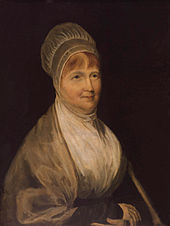Elizabeth Fry
Elizabeth Fry (born May 21, 1780 in Norwich , † October 12, 1845 in Ramsgate ) was a British reformer of the prison system and is known as the "angel of prisons".
Life
Elizabeth Gurney was born in Gurney Court, Norwich and raised in her family seat, Earlham Hall (now part of the University of East Anglia ). She was the fifth of eleven children of the wealthy banker , merchant and Quaker Joseph John Gurney . Her mother died when she was twelve years old. In August 1800 she married the London banker and businessman Joseph Fry (1777–1861).
As early as 1813, Elizabeth Fry visited Newgate Prison several times . Her great public achievement was in April 1817, when she succeeded in improving the condition of the prisoners in Newgate. These included u. a. the classification of criminals, female supervision for women, and adequate provisions for religious and secular acts. This also led to the introduction of these criteria in other prisons. She also visited prisons in northern England and Scotland .
Elisabeth Fry also founded a free school for orphaned girls at the Plashet House family estate. She later founded a school in London for the children of prisoners and, in 1819, a teaching and labor school for convicted female prisoners, which was run by a headmistress and twelve women under the name of the Newgater Association.
During a visit to Ireland in 1827, her attention was drawn to hospitals. Here, too, she achieved an improvement in the treatment of the mentally ill.
In 1838 she visited France , where she met senior prison officials. In 1839 she received official permission to visit all prisons in France in order to prepare a detailed report. In the summer of 1840 she traveled through Belgium , the Netherlands and Prussia and as a result motivated Theodor Fliedner and Johann Hinrich Wichern to stand up for the needy. On her return to London, she founded the Institute of Nursing Sisters there , which welcomed wealthy and devout women to teach them practical home nursing. From 1843 Elizabeth Fry was no longer able to travel for health reasons. But she was still in contact with various prison officials to monitor further improvements.
Honors

On October 1, 1952, a stamp from the Helfer der Menschheit series of the German Federal Post Office was dedicated to her .
Elizabeth Fry has appeared on the British five pound sterling note since 2002 . Many women's and children's houses in Germany are named after her.
Remembrance days:
- Protestant: October 12th in the Protestant name calendar
- Anglican: October 12th
literature
- Friedrich Wilhelm Bautz : Fry, Elizabeth. In: Biographisch-Bibliographisches Kirchenlexikon (BBKL). Volume 2, Bautz, Hamm 1990, ISBN 3-88309-032-8 , Sp. 148-149.
- Claus Bernet : 300 Years of Anglo-American Relations in Berlin: The Quaker Presence from the 17th Century to the Present. In: Yearbook for Berlin-Brandenburg Church History. 67, 2009, pp. 113-132.
- Gerlinde Viertel: Elizabeth Fry (1780–1845). A Christian social reformer. In: Monthly for Protestant Church History of the Rhineland. 55, 2006, pp. 343-362.
- Marie Hüsing : Elisabeth Fry, a life for Christ. 1983.
- Dietmar Kruczek: The "Angel from Newgate". 1996, ISBN 3-7615-4924-5 .
- William Lane Graffam: The Contestation of Elisabeth Fry. 1956.
- Laura E. Richards: Elizabeth Fry, the Angel of the Prisons. 1916.
- Manfred Berger : Fry, Elizabeth. In: Hugo Maier (Ed.): Who is who of social work. Lambertus, Freiburg 1998, ISBN 3-7841-1036-3 , p. 189 f.
swell
- Elizabeth Fry: Memoirs of the Life of Elizabeth Fry with Extracts from her Journals and Letters. Edited by two of her Daughters. 2 volumes, 1847–1848.
- Karl von Bunsen : Elisabeth Fry to the Christian women and virgins of Germany. 1842.
Web links
- Literature by and about Elizabeth Fry in the catalog of the German National Library
- Biography, Literature & Sources for Elizabeth Fry FemBio of the Institute for Women's Biography Research
Individual evidence
-
↑ Tim Winkel: Elisabeth Fry and Florence Nightingale - two diaconal paths in England with special consideration of the revival movement. In: Contributions to diaconal science. Volume A 54, Diaconal Science Inst. Ruprecht-Karls-Universität Heidelberg, 2006;
Richard G. Huntsman, Mary Bruin, Deborah Holttum: Twixt Candle and Lamp. The Contribution of Elizabeth Fry and the Institution of Nursing Sisters to Nursing Reform. In: Medical History. 46/3, 2002, pp. 351-380. - ↑ Elizabeth Fry In: Ökumenisches Heiligenlexikon.
| personal data | |
|---|---|
| SURNAME | Fry, Elizabeth |
| BRIEF DESCRIPTION | British prison reformer |
| DATE OF BIRTH | May 21, 1780 |
| PLACE OF BIRTH | Norwich |
| DATE OF DEATH | October 12, 1845 |
| Place of death | Ramsgate |
